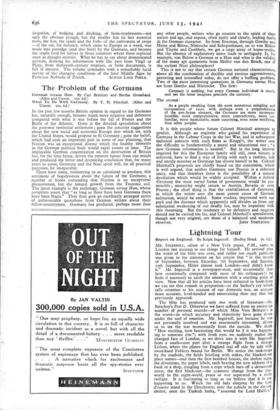The Problem of the Germans
German versus Hun. By Carl Brinitzer and Bertha Grossbard. (Allen and Unwin. tos.6d.) What To Do With Germany. By T. H. Minshall. (Allen and Unwin. tos.6d.) IN the past few months British opinion in regard to the Germans has, naturally enough, become much more negative and defensive compared with what it was before the fall of France and the Battle of the Atlantic. Gone is the detailed speculation about the post-war territorial settlement ; gone the concrete suggestions about the new social and economic Europe into which we, with the United States, would propose to fit Germany ; gone the belief, which had such an important part in some of our planning, that Nazism was an exceptional disease which the healthy elements in the German political body would expel sooner or later. The implacable German concentration on the destruction of Britain has, for the time being, driven the remoter future from our minds and produced the bitter and despairing conclusion that, for many years to come, Germany and the Nazi spirit will, for all practical purposes, be inseparable. There have come, ministering to or calculated to produce, this sentiment of hopelessness about the future of the Germans, a number of books contending that Nazism is no exceptional phenomenon, but the natural growth from the Teutonic soil. The latest example is the anthology, German versus Hun, whose compilers assert that " as long as there have been Germans there have been Nazis." They then give an excellently arranged series of unfavourable quotations from German writers about their fellow-countrymen. Germany has produced, perhaps more than any other people, writers who go counter to the spirit of their nation and age, and expose, often justly and clearly, leading faults in the German character. So from Erasmus, through Goethe and Heine and Berne, Nietzsche and Schopenhauer, on to von Billow and Tirpitz and Goebbels, we get a large array of home-truths. But the absence of explanatory notes leads to ambiguity. Is, for example, von Billow a German or a Hun and what is the validity of the many apt quotations from Moller van den Bruck, one of the earliest Nazi philosophers?
This is not to say that certain German national characteristics, above all the combination of docility and envious aggressiveness, persisting and intensified today, do not offer a baffling problem. Two of the most interesting quotations in Germany versus Hun are from Goethe and Nietzsche. The first: Germany is nothing, but every German individual is much, and yet the latter imagines precisely the contrary.
The second:
As a people resulting from the most monstrous mingling and juxtaposition of races, with perhaps even a preponderance of the pre-Aryan element, the Germans are more incompre- hensible, more comprehensive, more contradictory, more un- familiar, more incalculable, more surprising, even more terrifying, than other peoples.
It is this people whose future Colonel Minshall attempts to predict. Although an engineer who gained his experience of Germans in the Labour Corps in the last War, and in subsequent technical contacts with such firms as Krupp's, the writer sees the difficulty as fundamentally a moral and educational one ; "a new German reformation is needed." But in the long interval required for this the European family will still, once victory is achieved, have to find a way of living with such a restless, sick and unruly member as Germany has shown herself to be. Colonel Minshall's proposals are chiefly based on the contention, which is well argued, that neither Germany nor Prussia is a coherent unity, and that therefore there is the possibility of a natural devolution which would be widely accepted. Within a federal Germany the most varied forms of government would be per- missible ; monarchy might return to Austria, Bavaria or even Prussia ; the chief thing is that the centralisation of Germany, in which the writer sees the most potent cause of German militarism, would be ended. Some readers, impressed with our peril and the distance which apparently still divides us from any substantial weakening of our deadly foe, may be impatient with this theorising. But the tendency to be defensive and negative should not be carried too far, and Colonel Minshall's speculations, though not very original, are those of a balanced and moderate


























 Previous page
Previous page